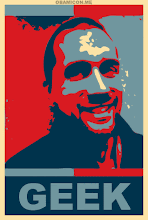Let's get serious, though - this action alone, of taking the rows away, already engages learners/audience members more than traditional, stuffy classroom experience. Everyone begins to learn before they realize it and, what's more, experience base bonds with experience base, and comeraderie is attained, as well. All joking/personal allegiance aside, Omar has this stuff on lockdown, and I know I'm going to walk away with a headful on how I can de-formalize some of the ongoing education of EMR/EHR users.
"Do you think the takeaways that you take from here will be the takeaways that you take from here?"
"Informal learning is a natural process and is different for each learner...it is done when it's least expected."
"If you present content that is attainable to an audience, you're going to increase adoption of the content and instill enthusiasm for the content."
"Software training doesn't feel like it's emotionally charged...but why the heck not? Why can't it be socialized?"
Those are the kind of questions/statements that make's Omar's stuff so heavy, but light. It's a simple question, but there's a lot to it. While the instructor/presenter will give us something, it's up to us ultimately how we take it away (not just what we take away). Already, I'm looking at my organization with a bit of a stern glance...why AREN'T we doing some things? Why AREN'T we doing more with informal/collaborative learning? Ahh, questions...
The "Long Tail of Learning" can be reinforced with things like webinars, teleconferences, virtual collaborations, and other on-the-job-practice activities (peer coaching, etc.). And students might not want to socialize after class via a social network, because they don't have the time for it. Solution - Shorten the class. The Collaborative effort is so much more significant than the continued bludgeoning of content (<-- my term, not Omar's), as it allows them to align with their peers. (Kind of like how we send providers back to their departments...)
Omar's Recipe for Increased Retention and Learning "ROI"
- 1 part Learning Event
- 2 parts On-Demand Content
- 3 parts Emotionally Charged Direction
- 5 parts Online collaboration/async knowledge sharing
- 5 parts Peer Coaching (learning through others)
- 3 parts Facilitator
- 1 part Online Collaboration Moderator
- 2 parts Follow-Up Event
Google/Yahoo Case Study Presentation
Emerging Leaders Program dissected over span of three weeks. Too many details to follow and type, but suffice it to say Peer Accountability and Continuous Asynchronous learning activities between peers weighed in very heavily as to items of 'importance'.
Yahoo also has something called Manager Central - what you do at all stages of management, basically. Key to this model is that the content is different every time a cohort jumps in. It's beyond constantly changing. The ILT looks at the blog and builds instruction off of it (as I understand it)...they rely on the network to answer the questions, rather than the instructor themself. To me, it almost seems like a "Wiki Course", if there ever was to be such a thing...moderator playing a VERY important part here, for sure.
Another Exercise (and why I'm bummed)
I realized that, in this room, I was in the top 5% of the "haves" as far as social/collaborative is concerned. We have all the tools, and YET, because of generational resistance, we're forced to use them on a very small scale (i.e. - not getting our true value out of it). This is the greatest frustration, and my solution that I suggested seemed to be right in line with Mr Nielsen's suggestion: Find a champion. If you want to use social learning, find the highest rank that knows what it is and likes it, and warm WAY up to them. Then, once they're pleased with how it works, they can spread to other high levels. Seems basic, but when you become emotionally vested in a topic/concept, makes it difficult to remain rational and hand over control of your fight to someone else.
As Omar puts it, "Adoption is emotional, and emotion drives adoption."
In Closing...
Omar goes on to present on where Genentech is at and where it's going. With him in the helm, at least of the informal learning aspect of things, there's nothing but good to come. I'm sure friendship might cloud my take on this session, but as objectively as I can say it - This session was phenomenal, and I'm certain the majority (if not all) of my fellow attendees would concur.


No comments:
Post a Comment